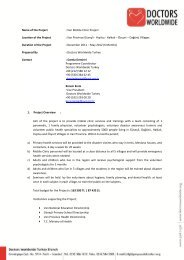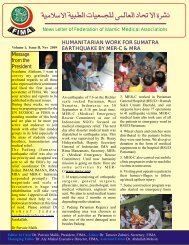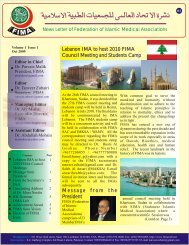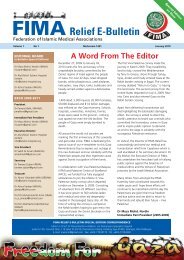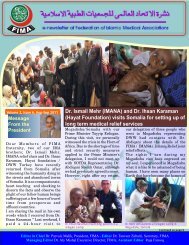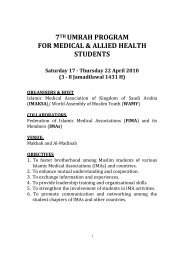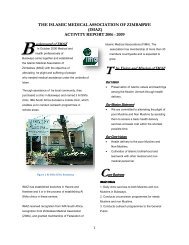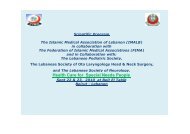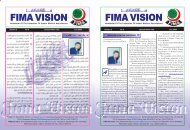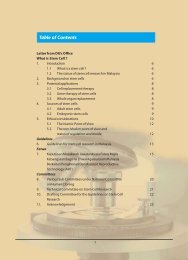FIMA Year Book 2009 - Federation of Islamic Medical Associations
FIMA Year Book 2009 - Federation of Islamic Medical Associations
FIMA Year Book 2009 - Federation of Islamic Medical Associations
Create successful ePaper yourself
Turn your PDF publications into a flip-book with our unique Google optimized e-Paper software.
Ethics <strong>of</strong> Clinical Researchspecial counseling team independent<strong>of</strong> the investigator.Guideline 18. Safeguarding ConfidentialityThe subjects’ research data should beheld in strict confidentiality. However,the subjects should be told the limits,legal or otherwise, to the investigator’sability to absolutely safeguardconfidentiality and the possibleconsequences <strong>of</strong> possible breeches <strong>of</strong>confidentiality.Safeguarding confidentiality is abasic tenet <strong>of</strong> <strong>Islamic</strong> law. This is the“trust” between an individual and thephysician/investigator. Exceptionsfrom the requirement <strong>of</strong> safeguardingconfidentiality are made in caseswhere concealing the confidentialinformation causes greater harm forthe person involved than that caused byrevealing it or when revealing it bringsa benefit that outweighs the harm <strong>of</strong>concealing it. This is based on the rule<strong>of</strong> the permissibility <strong>of</strong> commission<strong>of</strong> the lesser <strong>of</strong> two injuries to preventthe greater injury. Also, there arecases where revealing confidentialinformation is permitted because itbrings a social benefit or preventspublic harm. (20)Guideline 19. Right <strong>of</strong> InjuredSubjects to Treatment and ReparationResearch subjects are entitled to freemedical treatment when they incurany injury or any other harm as a result<strong>of</strong> their involvement in the research.They are also entitled to equitablecompensation for any impairment,disability or handicap that result fromtheir participation. In the case <strong>of</strong>death, their dependents are entitledto compensation. Their entitlement isbased on the principle <strong>of</strong> justice, thefourth principle <strong>of</strong> ethics. The sameis true from the <strong>Islamic</strong> point <strong>of</strong> view.This is based on the <strong>Islamic</strong> legalrule <strong>of</strong> reparation, which makes it anobligation for a person who causes anydamage to another to make equitablecompensation for the loss. When asubject dies as a result <strong>of</strong> his participationin research, his heirs are entitled tomonetary compensation, which is theblood money stipulated in <strong>Islamic</strong>legislation for accidental homicide. Theimplicit agreement between researchsponsor(s) and involved subjects entailsa religious responsibility on the part<strong>of</strong> the former party to make up forthe damages suffered by a subject as aresult <strong>of</strong> participation in the research.However, it was pointed out during thedeliberations in the Cairo conferencethat it is permissible for the investigatorsor sponsors to obtain in advance thesubjects’ informed consent to waive theinvestigators’ responsibility, includingtheir research subjects’ entitlementto compensation for disability andhandicaps, when they are not deliberatelycaused based on the fact that <strong>Islamic</strong>ally,a competent individual is entitledto waive voluntarily any right <strong>of</strong> his,provided that he does that completelyvoluntarily without any pressure,inducement or deception (20) . While thisis true, in my opinion there is danger <strong>of</strong>it being abused as it will be impossible<strong>FIMA</strong> <strong>Year</strong><strong>Book</strong> <strong>2009</strong>149




